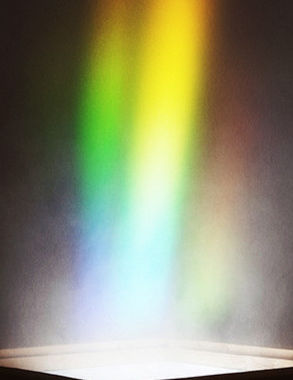Bloc Party’s enigmatic lead singer, Kele Okereke, has gone on record to say that the band’s last album, Four, felt like a forced attempt to go back to the sound of debut release, Silent Alarm. That he and his bandmate, Russell Lissack (with whom he co-founded the group), felt pressured to do so by the now departed Gordon Moakes and Matt Tong. Rather than airing dirty laundry, Kele was perhaps letting fans know that Hymns, his fifth album with Lissack since they met in 1998, was not to be a purely indie rock and roll album. The question on the lips of Bloc Party fans is whether the addition of Justin Harris on bass and Louise Bartle on drums will make for a happier family. And, most vitally, whether new members and Kele’s increasing fascination with electronic music will materialise into a great Bloc Party album.
Hymns’ opening gambit, The Love Within, is most definitely a gamble. The song is led by a slightly peculiar sounding synth which glissandos and wah-wahs throughout as Kele asks us, 'don’t you want to get high?' Admittedly, it takes a few listens to get your head around, but once you become accustomed to it, you can also enjoy a chorus as good as any Bloc Party have yet written, as he sings, 'the love within is moving upward, sweeter than any drug’. This ode to achieving legitimate euphoria without alcohol or drugs is more than just a grower, it’s the musical encapsulation of the love Kele sings of.
Next is Only He Can Heal Me, where the song’s main feature is an ensemble of voices singing in a choral style, with Okereke leading the choir. Such variety is consummated in The Good News, which indulges in country rock with organ and slide guitar, trailed by the heavily electronic, slow number, Fortress. With its synthesised beat, sub bass, and minimalist tone, it wouldn’t sound amiss on Kele’s deep house solo album, Trick. That influence is heard again in Different Drugs, a song that nearly matches the quality of The Love Within with its clever metaphors and soaring guitar.
This is not so much the case on Into the Earth, which is just pure indie, with its laid back Libertines style strum in its riff and absence of synths. While this constant switching up of styles not affecting the album’s cohesiveness is commendable, it becomes more and more noticeable that the pace of Hymns has slowed right down, and you yearn for a song as punchy as its opener. And sadly, that yearning goes unanswered: My True Name and Virtue are just fine as songs – nothing more, nothing less. Curtain call track, Living Lux, is bittersweet; it’s a very interesting, moving track, as Kele sings mournfully over an arpeggiator. But it also hammers home the sense that Hymns has been gradually losing steam, and that perhaps the other band members could have been utilised more in lieu of so much minimalism.
This record begins so brightly, and bursting with energy, but as the pace gradually stalls, its pacing becomes confused. While there are one too many songs which could just as easily have been part of the Kele solo discography, the problem isn’t the album’s reliance on electronics, but simply a lack of quality songs. So while Hymns ends somewhat disappointingly, there’s still a solid amount of innovative flair within. One would hope Bloc Party stay together this time. It’s a pivotal moment for this band and, as ever, we watch them with great interest.
Review by Adam Protz
